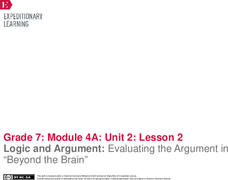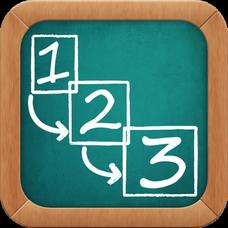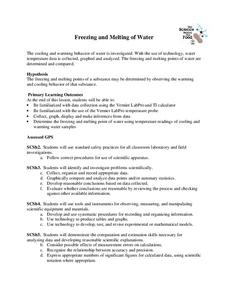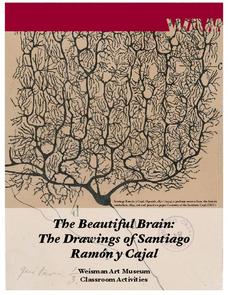EngageNY
Logic and Argument: Evaluating the Argument in “Beyond the Brain”
The brain is not the mind. Scholars explore the claim by reading an informational article about neuroscience research, "Beyond the Brain." As they read, they answer text-dependent questions and complete an anchor chart to evaluate...
EngageNY
An Exercise in Changing Scales 2
Reflect on altering scale factors. The last lesson in the series of 22 has the class compare the two scale drawings they created. They realize that the scale drawing becomes a scale drawing of each other. Class members continue to work...
Illustrative Mathematics
Heads or Tails
Heads! A great way to practice probability is to flip a coin in class. The provided data allows your mathematicians to predict the probability of heads in ten coin flips. Bring coins to class and allow your own trial of heads or tails....
Good Karma Applications, Inc
First Then Visual Schedule
Here is an app especially designed for care providers of children with autism or other developmental delays that will help them build customized picture schedules to help support the behavioral needs of their students.
Baylor College
Water in Your Body
Do you know how much water you have had in the last 24 hours? Do you know how much your body needs? For this hands-on activity, your class members will estimate how much water our bodies lose each day by filling and emptying one-liter...
Mobile Education Store
ConversationBuilder
Some students struggle in social situations or when it comes to conversing with peers. Conversation is key in developing relationships and in building strong social skills. This app can be used to help children with social anxiety, ASD,...
California Academy of Science
Which Way is North?
Who needs a compass to find cardinal directions? Just place a stick in the ground and record the movement of its shadow over the course of a day. Then, measure the shadow lengths in order to determine a north-south line. A simple...
Illustrative Mathematics
Measure Me!
How many unifix cubes tall are you? If you're not sure, then perform this math activity with your class and find out. Working in pairs, young mathematicians make measuring sticks out of unifix cubes in order to determine the length of...
Teens Finding Hope
Change Your Thinking
Learning to look at situations with positivity and accuracy is an ongoing practice. Use these worksheets to help your class members learn to build positive, self-affirming perspectives of situations they encounter.
Federal Reserve Bank
Saturday Sancocho
What does stew have to do with bartering? Learners will find out how by reading the story Saturday Sancocho, discussing the text, participating in a bartering activity in class (once with goods only and once with money), and...
Kids' Pages
Feelings/Emotions Matching
When you are feeling thirsty, you should...go to bed? Using common phrases and clip art images, youngsters practice matching feelings to what their appropriate responses should be.
Curated OER
Using Random Sampling to Draw Inferences
Emerging statisticians develop the ability to make inferences from sample data while also working on proportional relationships in general. Here, young learners examine samples for bias, and then use random samples to make...
Province of Manitoba
The Outdoors Camping and Survival Skills
Equip young campers with the tips and strategies for a safe trip to the outdoors with a series of lessons. They learn how to start fires with and without firewood, keep warm in snowy weather, and purify water to make it safe for drinking.
NOAA
Ocean Geologic Features
Sediment samples from the ocean bottoms tell scientists about climate change, pollution, and changes in erosion for the area. Groups of learners focus on sediments and their movement through water. During a hands-on activity, they...
NOAA
Mapping the Ocean Floor: Bathymetry
Bathymetry is not a measure of the depths of bathtubs! Through the three lessons, scholars explore two different types of maps and how they are made. The resource focuses on topographic and bathymetric maps and teaching the techniques...
NOAA
Community Ecology and Sampling
Seamounts in the Coral and Tasman Seas are home to more than 850 different species. Groups explore hydrothermal vents, researching the organisms found there and their energy source. They also learn about seamounts, exploring their unique...
PHET
Alpha Decay
There are different types of radioactive decay, and alpha decay is when there are too many protons in a nucleus. Here is a simulation that shows alpha particles being emitted from a polonium nucleus. Learners see how radioactive decay...
University of Georgia
Freezing and Melting of Water
Examine the behavior of energy as water freezes and melts. An engaging activity provides a hands-on experience to learners. Collaborative groups collect data and analyze the graphs of the temperature of water as it freezes and then...
Chicago Botanic Garden
Calculating Your Carbon Footprint
Unplugging from technology for one day per week will decrease your carbon footprint—are you up to the challenge? Part two in a series of three allows individuals to explore their personal carbon footprints. By first taking a quiz at home...
CK-12 Foundation
Lightning-Rod
Why do some buildings have lightning rods? Scholars explore the movement and attraction of opposing electrical charges through a simulation of a lightning rod. They control the cloud height, charge separation, and if the lightning rod is...
Trinity University
Explain Yourself: An Expository Writing Unit for High School
Introduce expository writing with a unit that asks writers to craft an essay to explain a belief, value, or priority that is important to them. Mini-lessons within the unit focus on crafting thesis statements and conclusions, selecting...
ThoughtCo
Compare and Contrast
How was your summer vacation? Encourage class members to meet their new friends with a back-to-school activity that compares summer vacations using a Venn diagram.
University of Minnesota
Beautiful Brain: Strangest Dream
Do words change or add meaning or interest to a work of art? The final lesson in a four-part series on the beautiful brain as a work of art focuses on art analysis. Scholars write a story about exploring art from the inside. Reflections...
The New York Times
Investigating the Heroin and Prescription Opioid Epidemic
How bad is the opioid crisis in America? Has it gotten worse in the last few decades? Why? High schoolers delve into these questions with a thorough and thoughtful lesson from The New York Times on heroin prescription opioids....
Other popular searches
- Potential and Kinetic Energy
- Potential Energy
- Potential Energy Diagram
- Potential Kinetic Energy
- Potential & Kinetic Energy
- Action Potential
- Gravitational Potential Energy
- Elastic Potential Energy
- Calculating Potential Energy
- Physics Potential Energy
- Potential Energy Pendulum
- Kinetic vs. Potential Energy























